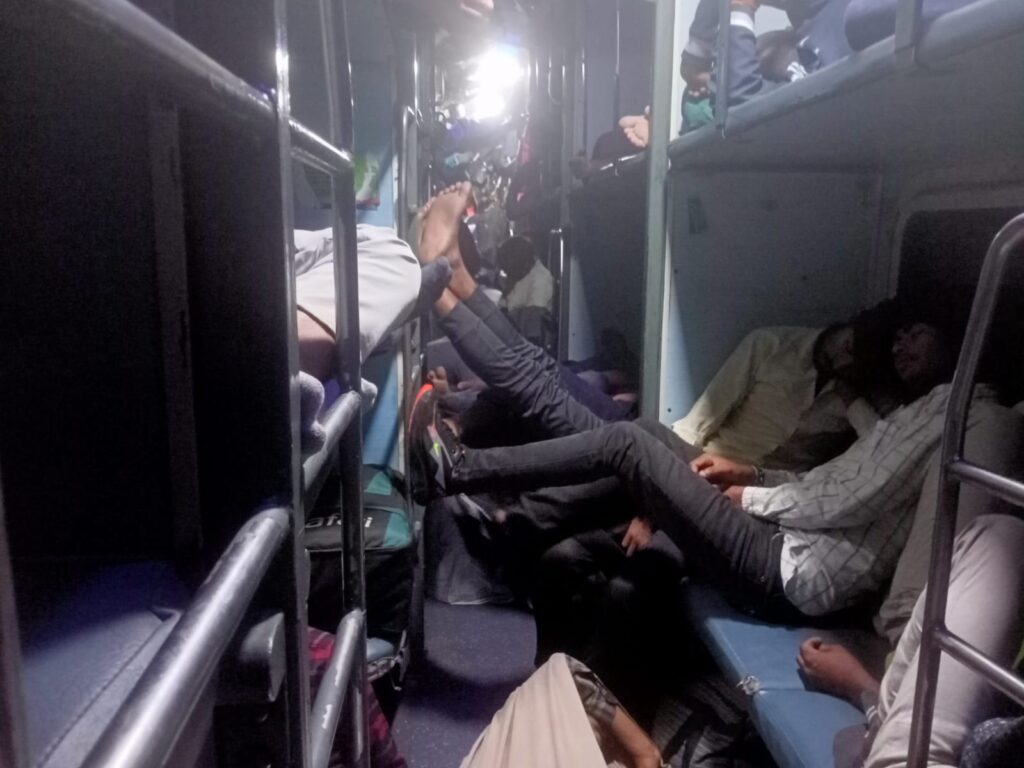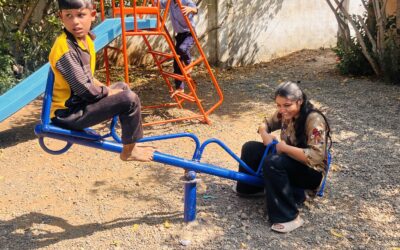Traveling in a general compartment during Diwali is not for the faint-hearted, but when life throws you into it, you come out with stories that are anything but ordinary. My 29 hour journey from Jodhpur to Howrah was a chaotic, cramped, and unexpectedly heartwarming experience.
A Cramped Beginning
I boarded the train armed with optimism, a backpack, and India Labourline’s visiting cards. Optimism was the first casualty. The first challenge was to get in, which I somehow after a few blows was able to manage. The compartment was overflowing with humans—there was no room to stretch a leg, let alone dream of sitting comfortably. I wedged myself into a corner, surrounded by a sea of travelers who shared everything but personal space. Sleep? Forget it.
Despite the chock-a-block conditions, the atmosphere was far from grim. Diwali spirit lingered in the air—strangers struck up conversations, kids ran amok in the little (whatever open spaces they could find), and hawkers threaded their way through the crowd like magicians.
Somewhere amidst the chaos, I realized this was a great opportunity to talk about Labourline’s work. I started chatting with workers around me, handing out visiting cards. People were intrigued—many had never heard of our organization that works for migrant workers’ rights. They shared their stories—stories of exploitation, unsafe working conditions, and wages that barely covered expenses.
A Feast Among Strangers
Around lunchtime, I was hungry, exhausted, and resigned to nibbling on dry snacks when a group of workers from Gaya generously offered me food. “Bhaiya, yeh lo, anda aur roti kha lo,” one of them said with a smile. I hesitated, but they insisted. The food was simple yet filled with warmth. After eating, I shared more about what a fellowship means and why I choose to come from east to west India, and they listened intently.

Love, Caste, Dancing Devotion Aur Bhim
One of the passengers, a young man, confided in me about his love story. He belonged to the Pasi community, a Dalit caste, while his girlfriend was from the Kanjar community, classified as Mahadalit in Bihar.
“Shaadi karni toh hai, par gharwale kabhi nahi maanenge,” he said, half-joking, half-serious. He added with a chuckle, “Jab bhag ke shadi karunga, aapko bulane aaunga”.
When I asked, “Aur mummy papa ko kaise manaoge?” He gave a smile and said, “Babasaheb ke baare mein baat karunga. Par unki sunta kaun hai?” His reverence for Ambedkar was evident, reflected in his Motorola phone cover that proudly displayed Babasaheb’s iconic portrait. He shared how Ambedkar inspires him to dream of a life beyond caste barriers. “Babasaheb ka naam hi himmat deta hai, par gharwale woh baat nahi samajhte,” he said with a mix of pride and frustration.
While sneaking into the sleeper class, I encountered a lively group of ISKCON devotees singing and dancing to “Hare Krishna” chants. Among them was a former software engineer who left his job in a U.S. based firm to follow the path of Krishna, a civil engineer who decided to quit his 15 year job and turned to devotion, and a 16-year-old boy just starting his spiritual journey. They offered me prasadam and even a seat, urging me to buy a full-ticket for the journey, since some of their members could not join them they had a few extra tickets. I negotiated with them and paid from Mughalsarai (Oh sorry, Pt. Deen Dayal Upadhyay junction) onwards.
Public Commons
Though their joyful chanting filled the coach, most passengers seemed irritated, likely wishing for some peace amidst the already crowded train. Ironically, after their spiritual revelry, the devotees ardently guarded their seats, sparking a thought in my mind: Did Krishna not preach the concept of sharing? Or was I confusing the divine with my own belief of public commons?
In the unspoken culture of general compartments, the concept of a public commons comes alive, where a railway ticket often serves as a mere formality. Seats are claimed not by reservation but through a mix of negotiation, persistence, and mutual understanding. It’s an unregulated agreement between passengers, where space is shared, ceded, or even debated, transcending the rigidity of booking systems. The ISKCON devotees’ reluctance to share their reserved seats stood out against this unwritten norm, highlighting the contrasting dynamics of personal entitlement versus communal survival on Indian trains.
Moments Of Humor
Amid all these conversations, there were moments of comic relief. A group of teenagers were playing cards when one loudly declared himself the “king of poker,” only to lose spectacularly in the next round. Another man tried to sell me a miraculous herbal oil that he claimed could cure “everything except heartbreak.” The sheer absurdity of the pitch had everyone laughing.
By the time the train rolled into Howrah, I was exhausted yet oddly content. A general compartment journey is a microcosm of India—messy, unpredictable, but full of connections that make it all worthwhile. It was a reminder that even in the most uncomfortable situations, there’s room for generosity, humour, and shared humanity. And yes, if that young man ever gathers the courage to elope, I’ll be there at his wedding, cheering for love over societal norms.




0 Comments